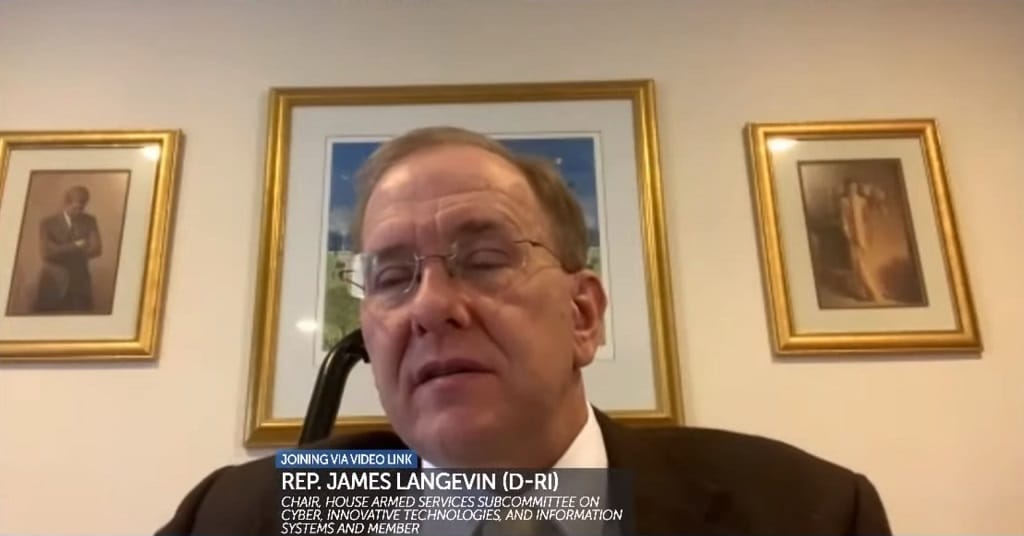Despite Increasing Risk, Companies Are Still Not Prioritizing Cybersecurity
March 10, 2021 – Experts said Tuesday that cybersecurity should be one of the top priorities for every business, but many businesses still don’t consider it as such. “I was not that surprised to see 50 percent of executives count it as a high priority,” said Chad Kliewer, the information security of

March 10, 2021 – Experts said Tuesday that cybersecurity should be one of the top priorities for every business, but many businesses still don’t consider it as such.
“I was not that surprised to see 50 percent of executives count it as a high priority,” said Chad Kliewer, the information security officer of Pioneer Telephone Cooperative, at a Tuesday webinar hosted by the Center for Strategic and International Studies.
“Let’s be honest, its not a moneymaker for most people,” he added.
Rep. James Langevin, D-R.I., who is chairman of the House Cyber, Innovative Technologies and Information Systems Subcommittee, was joined by several members of both the public and private sectors discussing cybersecurity for small and medium-sized businesses in the critical infrastructure industry. They used US Telecom’s recent 2021 Cybersecurity Survey as a backdrop for that discussion.
According to the survey, 26 percent of employees, versus 50 percent of executives, consider cybersecurity a high priority. Kliewer expressed disappointment about that gap, saying that for his company, he spends a lot of time focusing on employees and ensuring that they’re all informed on cybersecurity.
One challenge to be addressed to get businesses up to speed on cybersecurity is education and awareness.
Jeff Goldthorp of the Federal Communications Commission suggested on the webinar the possibility of federal agencies to providing “fairly robust and rich and large set of guidance and practices” to a smaller segment of the industry that “has a different set of needs or where the scale is smaller,” he said.
Ola Sage, CEO of CyberRx, expressed similar concern. There could be several reasons why employees don’t make cybersecurity as high a priority as executives, she said, including lack of mechanisms to communicate that message across the company, or employees believing that cybersecurity isn’t their personal responsibility. It comes back to the question of education and awareness, she said.
Langevin said cyber criminals often go after a broad range of targets, hoping to hit the easiest victims. “These criminals go after entities really with the weakest cybersecurity hygiene, which often unfortunately means small businesses,” he said. “Ransomware is rampant right now, and its hitting a lot of small businesses in addition to hospitals or school systems,” he said.
Langevin said cybersecurity monitoring is about “risk management,” which is an ongoing process.
The influence of foreign nation-state adversaries
The webinar came in the wake of other cybersecurity panels and congressional hearings on the recent SolarWinds cyberattack that infiltrated thousands of American companies and federal agencies. The hack is currently being blamed on Russia.
Langevin touched on the influence of foreign nation-state adversaries. “I want to make something perfectly clear: countries like Russia actively aid and abet cyber criminals,” he said.
“We’re really living in a golden age of cyber crime because there are countries, again, that allow and encourage criminals to operate within their borders,” he said. “While some of the talk of norms and the need for stronger cyber diplomacy may seem esoteric, I can really assure you that it is increasingly relevant to stopping the constant stream of intrusions targeting small businesses around the country,” he said.
Eric Goldstein, executive assistant director for cybersecurity at the Department of Homeland Security’s Cybersecurity and Infrastructure Security Agency, said “adversaries of all types are targeting American businesses now.
“It is not just the case that if you are a company that has highly sensitive [intellectual property] or provides critical infrastructure that you are the only type of company at risk. We are now seeing adversaries, including criminal groups, that will launch what I call indiscriminate attacks targeting anybody in this country with a vulnerability,” he said.
“Every company in America is at risk,” he said, adding they need to “take urgent steps to manage vulnerabilities in their IT infrastructure.”











Member discussion